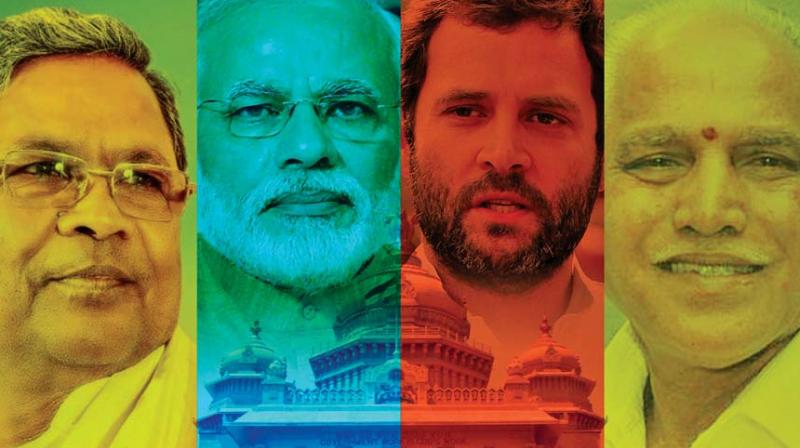Another edition of Great Indian Powergrab'

This will never be a case of much ado about nothing. The drama might have ended in an anticlimax, but the events were deeply reflective of the malaise of Indian politics. This has become a unique people trading mechanism. And they have the temerity to insult equine thoroughbreds by calling it horse-trading. If only they get to see how polished an operation is the breeding and selling of thoroughbreds!
It is as well that the drama in the legislature was of short duration with the aspirational chief minister beating a hasty, if emotional, exit. But what went before was a comment on what elections have come down to in the country.
They are a naked conduit to power rather than an opportunity to serve the people and which must be won at all costs. When administration becomes an enterprise, many are willing to ‘invest’ their time and money.
It was painful watching the live projections on counting day because in your heart of hearts you wanted both parties to lose - the BJP ruling at the Centre and the Congress ruling Karnataka. As irony of ironies would have it, the third ‘horse’ would end up winning the race, in the Stewards’ Room as it were. But then, decades ago, Deve Gowda had perfected the art of the possible, which is politics, and had even ruled the country as Prime Minister.
The BJP had had experience of this feeling of being isolated as they did in 2013 when they were the single largest party in Delhi with a number very close to the majority but could not cobble together the few legislators needed to make a majority. The same should have been obvious to them before the Karnataka elections, in which they may have spoiled their chances by not making proper overtures to JD(S), an old but most unreliable of allies.
The same may become a problem again in 2019 even if the BJP emerges as the single largest party nationally, which they might, but would still struggle to find allies if they are short of the magic number. This may sound as if all the wolves are in a pack against a common enemy, but this is realpolitik as much as it is a matter of the so-called liberals up against the Right. But all that is in 2019. Meanwhile, there will be more of these dramas to be endured in the next few state elections coming up before the national vote in a year's time.
This great nataka was not so much about the popular mandate - which was solidly against the Congress anyway - as about the role Governors play. But don’t blame the gentleman for choosing the course of action he did. He was obviously instructed to do so. There have been so many instances of Governors using any one of the options open to them that Vajubhai Vala is not to be singled out. Why don’t India’s great constitutional experts sit down and thrash it out in pure arithmetic terms so that we don’t face this situation again? We can certainly write an algorithm that will define the route through numbers alone.
Indian political history is pockmarked with instances of not only power grabbing but also outright skullduggery against opponents. Remember the 1952 general elections, the nation’s first, in which the Indian National Congress won 35 seats out of 75 in core Tamil-speaking constituencies. (In composite Madras State, Congress won 152 seats out of 375 seats and was in the minority.) And who ruled? Not the legislators who were opposed to the Congress and could have had the majority if they wished.
Hence, it should not surprise us that the present scene is not really different from the very birth of Indian democracy with the 1952 elections.
Consider this. JD(S), now the major partner in an opportunistic alliance with Congress, contested 218 seats in the 2013 elections. It won 38 seats while losing in 180 constituencies in which it lost its deposit in 147 seats. This is no popular mandate by any stretch of imagination. Suffice it to say that in the first past the post system there will be several glaring anomalies. This may not justify the Goa and Manipur outcomes in terms of post-poll alliances grabbing the gaddi from the single largest party, but it certainly points the way to the future when this will happen in almost every state because the people may not wish to give any party a clear majority.
It is clear from the Karnataka mandate that people have lost faith in politicians and their parties. Fractured verdicts may be the order of the day and the role of Governors will become more and more important.
The history of Governors in Raj Bhavans is as pockmarked as everything else in the ‘Great Indian Powergrab’. There are no rules in this game, only different viewpoints and all of them invariably clouded by political allegiance and outright partisanship. Long live Indian democracy!
(R. Mohan is the Resident Editor of the Chennai and Tamil Nadu editions of Deccan Chronicle)

